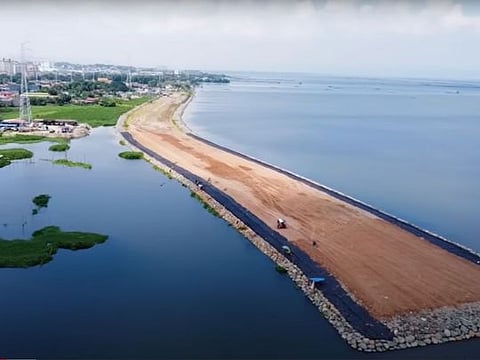Easing Manila traffic? $2.6-billion approved for Laguna lake-side expressway
Greenlight for 2 loan packages for ambitious Laguna Lakeshore Road Network project

Manila: A spending plan of $2.6 billion (Php152.16 billion) will pave the way for the ambitious Laguna Lake expressway aimed at helping ease traffic in the Philippine capital.
The project, known as the Laguna Lakeshore Road Network (LLRN), will be bankrolled by government-guaranteed loans.
Manila announced on Monday (January 20, 2024) that it has secured a $905.26 million loan (approximately Php54 billion) from South Korea to fund the initial phase of LLRN.
In November, the Asian Development Bank (ADB) approved the $1.7 billion (Php99.4 billion) to cover the construction of a 37.5-km expressway that forms part of the new road network, comprised of two major phases.
Flagship project
The LLRN is a “flagship infrastructure” project aimed to alleviate traffic congestion in Manila, and bolster the road infrastructure around “Calabarzon”.
The project envisions a “climate-resilient expressway”, in line with the vision for a Greater Capital Region. If executed well, it is also expected to have a knock-on effect on the country’s economy.
The other stated aim: raise the “institutional capacity” of the Department of Public Works and Highways (DPWH).
Laguna, and its neighbouring provinces of Cavite, Batangas, Rizal and Quezon — or the so-called “Calabarzon” (total land area 16,560 km2) — is a resource-rich, agro-industrial region that’s about 22 times the size of Singapore, and half the size of Belgium.
Its energy needs are currently covered in part by renewables, such as hydro-electric and geothermal power plants located in the area.
Sub-par infrastructure
Decades of under-investment in infrastructure, as well as more than a century of over-concentration of economic decision-making in Manila, has led to a virtual paralysis in the capital.
Economic losses due to poor infrastructure that leads to Manila's notorious traffic mess is estimated to cost the local economy $21.84 billion (Php1,277.5 trillion) annually.
Development assistance
The official development assistance (ODA) loan was provided by the South Korean government through the Export-Import Bank of Korea (KEXIM).
Loan agreement
Public Works and Highways Secretary Manuel Bonoan announced that the ceremonial exchange of the loan agreement took place on Friday at the Department of Finance office in Manila.
The event was attended by KEXIM Executive Director Um Sung-Yong, South Korea’s Ministry of Economy and Finance First Vice Minister Kim Beom-Seok, Finance Undersecretary Joven Balbosa, and other key officials from the Philippine government.
"The traffic decongestion programme is one of the department's strategic infrastructure priorities, aligned with the 2023-2028 Philippine Development Plan and consistent with the President's 8-point socioeconomic agenda to reduce transport and logistics costs," Bonoan told local media.
Sign up for the Daily Briefing
Get the latest news and updates straight to your inbox



